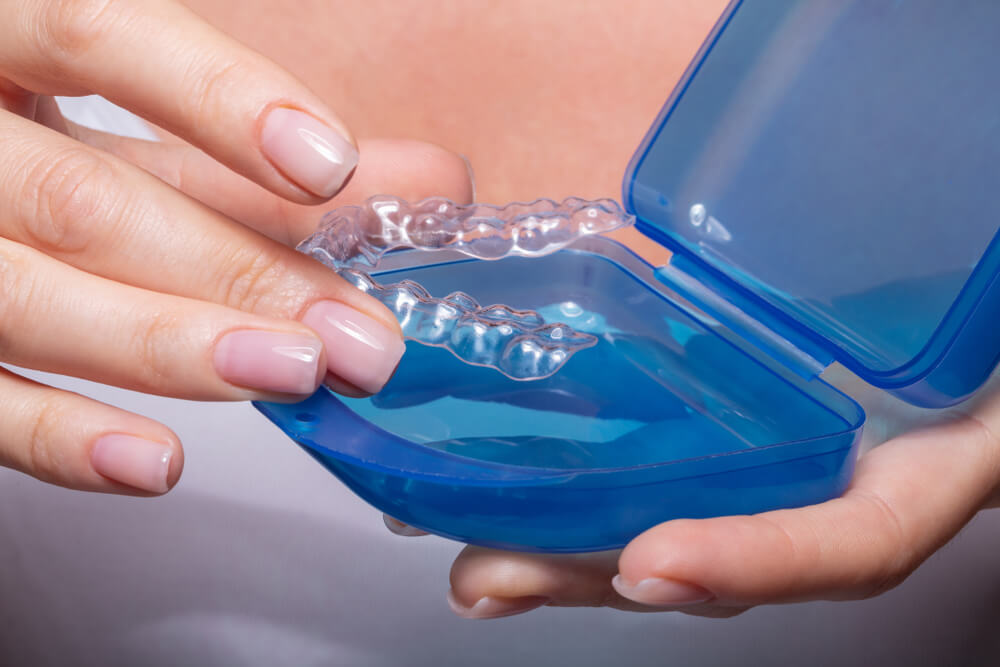Night guards, sometimes known as orthotics, are oral appliances made from medical silicone or plastic that are custom-fabricated to fit over the teeth. They are often used to prevent nighttime teeth grinding and clenching, as well as to properly position the jaw to relax hyperactive muscles and decrease TMD symptoms. While most dental night guards are primarily made to protect the teeth from becoming damaged as a result of bruxism, our office uses a neuromuscular approach to fabricate your custom night guard. Using a neuromuscular approach means that we look into the relationship between the teeth, muscles, and jaw joint position. We then use this information to fabricate a night guard that will hold your jaw in the most relaxed position in order to promote healing and a reduction of TMD symptoms.
Did You Know?
Traditionally, dentistry focuses only on the teeth. This is why most night guards are designed solely to protect the teeth from damage. Neuromuscular dentistry, however, focuses on three factors: the teeth, muscles, and jaw position. This approach reduces primary pain in the jaw, as well as secondary pain in the neck, head, and shoulders.
Frequently Asked Questions:
Do I need a night guard?
While only a dentist can diagnose your need for a night guard, you may benefit from wearing a night guard if you experience any of the following on a regular basis:
- Jaw pain
- Problems biting and chewing
- Pain while biting and chewing
- Tooth pain
- Facial pain
- Inability to open or close the mouth completely
- Popping or clicking noises when the mouth opens/closes
- Headaches/migraines
- Ear pain/tinnitus
- Teeth grinding or clenching at night
To determine if you can benefit from wearing a night guard, schedule a consultation with our office today.
How is my need for a night guard diagnosed?
To determine if you will benefit from wearing a night guard, our office will perform a comprehensive evaluation of your teeth, muscles, and jaw position using advanced diagnostic technology such as:
BioEMG
Electromyography (EMG) is a diagnostic technique that uses electrodes attached to the skin to record the electrical activity of muscle tissue. By measuring the electrical activity of a particular muscle, EMG provides information about which muscles are resting properly and which muscles are hyperactive. This information is then used to develop a treatment plan that balances muscle tone with proper bite position to reduce TMD symptoms.
T-Scan
T-scan is the only diagnostic technique used to analyze occlusal forces that can measure both time and the force of biting pressure. By using ultra-thin disposable sensors that translate pressure into a digital image, T-scan produces a digital map of the mouth that shows areas of uneven occlusal force. This information can then be used to make the necessary adjustments in order to even out the bite force. T-scan can also be used after placing dental restorations to ensure the bite force is evenly distributed.
K7 Evaluation
The K7 evaluation system is a neuromuscular approach to treating TMD that looks for dysfunction in the nerves or muscles around the joint by delivering small amounts of electricity to the muscles. This relaxes the muscles and allows them to return to an optimal position. At this point, the K7 unit is used to record diagnostic information. The K7 unit contains a mandibular scanner, an electromyograph, and a sonograph. The mandibular scanner produces 3-d images of the jaw and mouth, the electromyograph records electrical activity to ensure this position decreases muscle activity, and the sonograph records sound in the jaw joint to diagnose possible joint damage.
What should I expect when wearing a night guard?
The information obtained from the diagnostic technology will be used to determine the most relaxed position for your jaw. Your night guard will then be fabricated in order to maintain this position while you sleep. Upon receiving your night guard, your dentist will discuss exactly how to wear and care for it. In most cases, you can expect to wear your night guard every night. You can also expect to attend follow up appointments so your dentist can assess your progress and make adjustments to your treatment plan as necessary.

